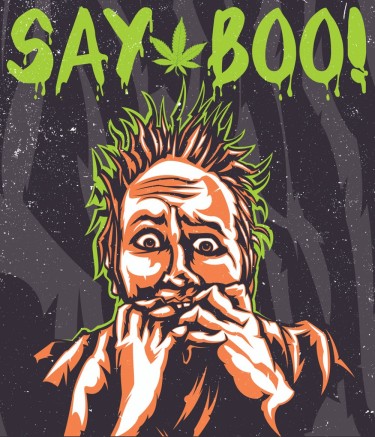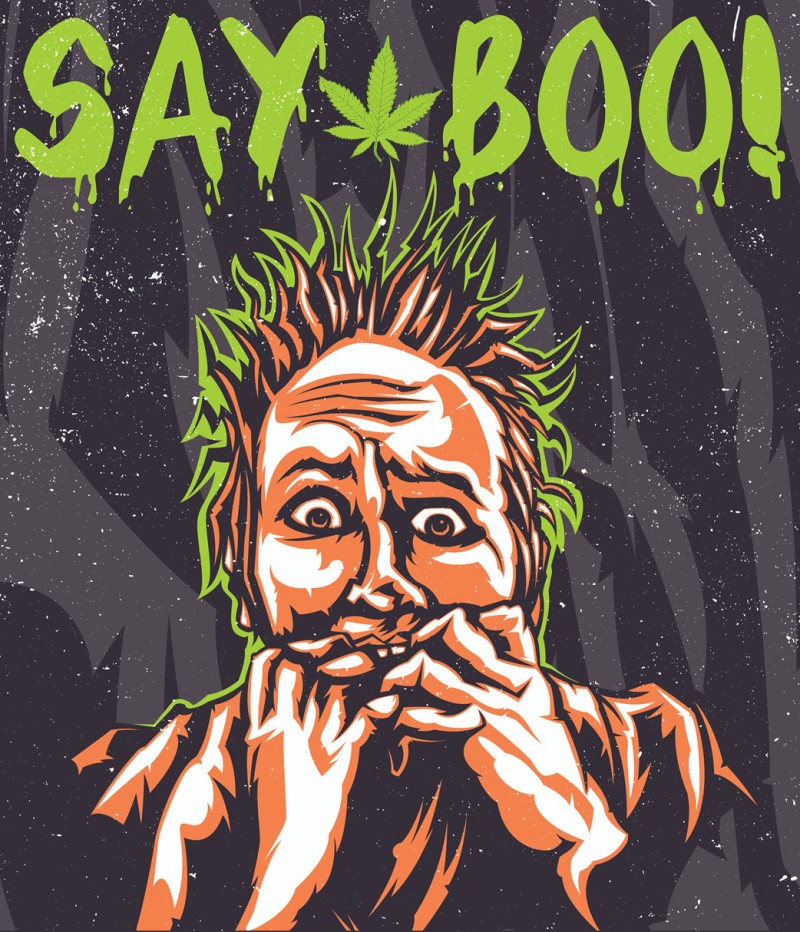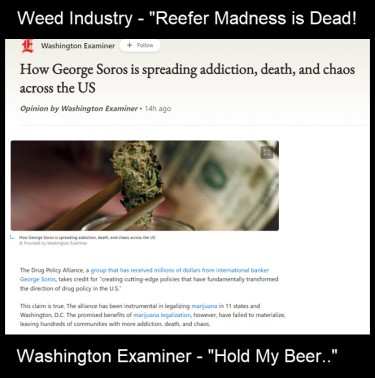
Reginald vs the Examiner - Exposing Lies in Modern Reefer Madness
My editor shared this article with me and said, “right up your alley!” and he wasn’t wrong. Published in the Examiner, as the Examiner, meaning, that this is the opinion of the entire organization, some modern Reefer Madness was being spewed and of course - it’s my duty to shine the light on the lies and deception generated through the machinations of prohibition and its associated rhetoric.
While the article isn’t too long, it does provide us with insight to the mind of the prohibitionist and it makes one question, “Who sponsored this article?”
Typically, they have some author attached, but this time it’s simply “The Examiner”.
Nonetheless, let’s analyze the drivel and provide some fresh perspective on the content.
A Quick Summary of the Reefer Madness
The article published in The Examiner attempts to discredit the Drug Policy Alliance's role in legalizing marijuana and argues that the promised benefits of legalization have not materialized.
The author dismisses the idea that marijuana has medicinal properties and claims it is addictive, especially for young users, and linked to schizophrenia and brain damage. They assert that marijuana legalization has led to increased addiction, crime, and ruined families.
The article also challenges the supposed benefits of legalization, stating that crime has not decreased, tax revenues have fallen short, and marijuana serves as a gateway to more harmful drugs.
The author blames the Drug Policy Alliance - and more importantly George Sorros - for these negative outcomes and warns other states to resist their advocacy for legalization.
However, the article is riddled with biased claims and misinformation.
By starting with an attack on the Drug Policy Alliance's funding source and dismissing their achievements, the author sets a negative tone from the beginning.
The assertions made about “marijuana's addictive nature, its direct links to schizophrenia and brain damage, and the notion that it is a gateway drug” are cherry-picked and fail to consider broader scientific research on the subject.
There is no definitive link between any of these things, and in essence, in places where cannabis has been legalized we have seen a decrease in many of these metrics, including a reduction in youth consumption.
The claim that crime has increased with legalization fails to acknowledge the complexities of the relationship between cannabis and crime, and ignores the potential positive effects of regulation and taxation.
For example, it speaks of the “black market” as if it’s a side effect of marijuana legalization.
Marijuana legalization has clearly increased crime. Strict regulations and taxes placed on legal marijuana sellers have created a vast illicit market that easily undercuts the legal market on price. - The Examiner
Except, it didn’t! The vast illicit market has existed for decades and is directly related to prohibition. From Colombia to Mexico, the cartels, street gangs, and your indie growers have all made up the “illicit market” they claim legalization created. However, we know that black market activities existed well before any state legalized cannabis meaning that it is actually the fruits of prohibition itself.
What’s more, it forced the illicit market into the hands of criminals. People willing to break the law and scale their efforts, tend to expand their illicit endeavors and as we’ve seen with Mexican Cartels - they do everything nowadays!
But here comes the kicker from the article;
And because possession is legal, it is virtually impossible to crack down on the illegal market.
The author argues that the illegal cannabis market, run by drug cartels and street gangs (and the indie growers), can’t be stopped because “possession is legal”.
Then what was the excuse when possession was illegal? Not only did prohibition have nearly 50-years of uninterrupted, blank-check, “I’m going to shoot your dog” authority and under this social configuration, cartels grew in size and wealth exponentially.
The Examiner article's alarmist language and lack of nuanced analysis undermine its credibility and present a biased perspective.
To truly understand the impact of marijuana legalization, a comprehensive examination of scientific research, social and economic data, and the experiences of different states is necessary.
Yet I doubt that the purpose of the article was to actually get to “truth” but rather it’s to shape opinion.
Allow me to get conspiratorial.
Project Mockingbird…
If you haven’t heard about Project Mockingbird let me introduce you to the concept.
Project Mockingbird, as revealed through declassified documents, was an operation in which the CIA sought to shape public opinion by infiltrating and influencing various media organizations. The goal was to ensure that the narrative aligned with the government's interests. Although the program was officially discontinued in the 1970s, it raises concerns about the potential continuation or evolution of similar efforts in the present day.
We know that as of the pandemic, the “misinformation board” and the “fact checkers” were routinely “fact-checking” truth to suit a government narrative. This isn’t conspiratorial at all.
However, in the world of Chat GPT and similar technology, we need to consider that these programs are more easily conducted than ever before.
Considering this historical context, one might speculate that the article from The Examiner, with its biased and alarmist tone, could be an indirect product of such programs aimed at controlling public perception. While we cannot definitively attribute this article to Project Mockingbird, it is essential to remain vigilant about the potential influence of government agencies or other powerful entities on media outlets.
Maintaining an informed and critical perspective is crucial in today's media landscape, where disinformation and propaganda can easily permeate public discourse. The lack of author attribution in the article from The Examiner may be a deliberate strategy to obfuscate the true origins of the message and shield it from scrutiny.
To counteract potential manipulation, individuals should actively seek diverse sources of information, fact-check claims, and engage in critical thinking. By being aware of historical instances of media manipulation and staying vigilant, we can better evaluate the validity and credibility of the information presented to us.
While we cannot definitively prove the connection between the article and Project Mockingbird, it is important to question the motives and potential biases behind media content.
An open and informed society depends on the ability of individuals to discern fact from fiction and to challenge narratives that may serve ulterior agendas.
These days, that has become surprisingly difficult even within known spaces such as science and math - that could or could not be racist, according to some.
Before you simply dismiss…stop and think….
Conspiracy Theory has become a weapon to dismiss ideas and has been utilized in recent years for too often.
For example, at the beginning of the Pandemic, to think that the virus originated or leaked from a lab in Wu Han was pure conspiratorial. However, nowadays, the vast majority of the evidence suggests that its exactly where it came from.
There’s a bunch of other conspiracies that turned out to be true in the past as well. Here’s a few of them;
-
Operation Northwoods: In the early 1960s, the U.S. Department of Defense proposed a plan to carry out false flag terrorist attacks on American soil to justify military intervention against Cuba. Declassified documents later confirmed the existence of this plan.
-
MK-Ultra: In the 1950s and '60s, the CIA conducted secret mind control experiments under the MK-Ultra program. The agency's involvement was exposed in the 1970s through congressional investigations and declassified documents.
-
Tuskegee Syphilis Study: From 1932 to 1972, the U.S. Public Health Service conducted an unethical study on African American men, withholding treatment for syphilis without their informed consent. The details of this study were revealed in the 1970s, leading to significant reforms in research ethics.
-
Iran-Contra Affair: In the 1980s, it was revealed that the U.S. government had secretly facilitated the sale of weapons to Iran to fund Nicaraguan Contra rebels, despite an explicit congressional ban.
-
NSA Mass Surveillance: The revelations by whistleblower Edward Snowden in 2013 exposed the widespread surveillance programs conducted by the National Security Agency (NSA) without public knowledge or consent.
Now this isn’t to say that my claim that the Examiner’s Reefer Madness article is evident that it’s from Project Mockingbird or similar programs, I simply provide the above historical events as evidence that they do exist.
In fact, they are far more prominent than you are and mostly not done by governments, but private entities.
Just check out this quote from Transparency.org about the state of the world in relation to their “Corruption Index” and it’s effect on the world;
The global average remains unchanged for over a decade at just 43 out of 100. More than two-thirds of countries score below 50, while 26 countries have fallen to their lowest scores yet. Despite concerted efforts and hard-won gains by some, 155 countries have made no significant progress against corruption or have declined since 2012.
Conflict, security and trouble at the top
Global peace has been deteriorating for 15 years. Corruption has been both a key cause and result of this.
Corruption undermines governments' ability to protect people and erodes public trust, provoking more and harder to control security threats. On the other hand, conflict creates opportunities for corruption and subverts governments' efforts to stop it.
Even countries with high CPI scores play a role in the threats that corruption poses to global security. For decades, they have welcomed dirty money from abroad, allowing kleptocrats to increase their wealth, power and destructive geopolitical ambitions. - Transparency.org
Only the naive would believe everything that they hear on the news in this day and age.
The Sticky Bottom Line
I always intend to provide my readers with a nuanced perspective. I know that I am biased towards freedom of consumption. It’s not so much about the drugs itself, as about having the freedom to decide.
This is something that is fundamentally missing from modern society. We’re asked to be more inclusive and tolerant, yet we aren’t allowed to exercise a simple act of consuming a plant without some form of scrutiny.
The potential “psyop” article from the Examiner is nothing but propaganda. Interestingly, it used those very words in the beginning of its article.
However, it’s my hope that with this article, no matter how crazy it became - it made you stop and question your government, your parties, your allegiances.
At the end of the day, all of this corruption, all of these psyops only exist with your participation.







